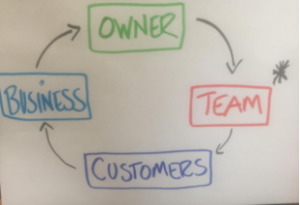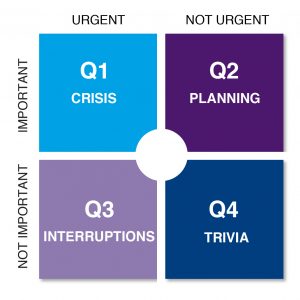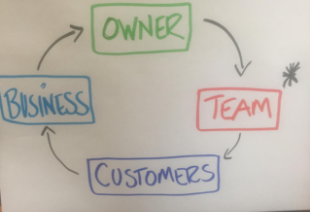Intellectually leaders “get it” – have better work conversations and business performance improves. The reality is that attitudes, emotions, time, ego, job titles, perceived risks, fear of failure, comfort with status quo all get in the way and hold these same leaders back from translating intellect and knowledge into actual and real behaviours.
Our current VUCA business environment puts leaders under great pressure to perform with limited resources at their disposal. Leaders manage performance by juggling the focus they bring to the task and to the people who get the tasks done. Given the choice between people and task orientation too many are still choosing to survive by bringing a focus on task. They do this because in the short term it means they produce the expected or planned results despite the chaos of volatility, uncertainty, complexity and ambiguity. Such a focus enables them to keep the owners/shareholders satisfied, at all costs.
However, it is increasingly obvious the people in their teams represent the competitive edge for their business – taking care of people is vital and this care is demonstrated by engaging in work conversations. People want to connect, they want to be engaged and feel they have purpose. Yet engagement scores are at an all time low.
Leaders benefit by rethinking their attitude toward people and stop referring to “soft skills” when engaging in “real” work conversations. Rather adopt the mindset these conversations are actually the “hard stuff”.
 Consider the 4 critical groups of stakeholders – who is the most important if leaders are keen to get the best and most sustainable outcomes for the business and ultimately the owners?
Consider the 4 critical groups of stakeholders – who is the most important if leaders are keen to get the best and most sustainable outcomes for the business and ultimately the owners?
Easy – start with the team – recruit the right people and then treat them so well that they treat the business like it’s their own! This is what it means to have “engaged employees”. When leaders have engaged employees the customers are treated exceptionally well and as a result the business performs. And when the business performs owners are happy.
So, let’s look in detail what holds leaders back from having better work conversations that enable better relationships and better employee engagement? Why don’t leaders prioritise team relationships when managing performance?
We are observing the intellect of leaders being overridden by their:
- Fear
- Attitude
- Busyness
- Uncertainty about content and context
- Comfort and predictability of the current status quo.
FEAR
Evidence supports the top five fears felt by leaders preventing them from having better and more real work conversations are the:
- Fear of not having the answers – I’m getting paid the big bucks to know the answers
- Fear of giving away too much – easier to rely on confidentiality as my crutch?
- Fear of hearing something I really don’t want to hear – then what do I do with it?
- Fear of retribution – better to remain silent and show passive consent?
- Fear of judgement – damage my personal brand and people stop liking me.
ATTITUDE
Reframing the importance of people to results and then changing the thinking brought every day in the decisions made and the conversations had – authentically prioritising people as important. For example: the CEO of Tesla, Elon Musk sent an email to his employees claiming: “No words can express how much I care about your safety and wellbeing. It breaks my heart when someone is injured building cars and trying their best to make Tesla successful.” He didn’t talk about the lowering of productivity when time is devoted to dealing with the injured person or the time it takes to change the rosters to cover for the injured person! He went on to state he would meet personally with any injured person to find out first hand what had happened to cause the injury to ensure it didn’t happen again.
Stop referring to the skills used to engage in conversations and manage the performance of people as “soft skills” – reframe them as the business critical human skills. Start truly believing in the importance of people to the business.
BUSYNESS
Through the collection of diagnostic data we see too many leaders claiming “things are more important than people” and this equates to them failing to prioritise conversations as important. Sure many leaders have WIP meetings every week with each individual who reports to them – these are better knows as “work in progress” meetings. These conversations might be with people but they focus on the things these people are doing – the tasks, the milestones, the deliverables.
 FranklinCovey, experts in time management and productivity, show us how leaders spend far too much time in Q1: Crisis – where everything is important and urgent. Estimating as much as 75% of leaders time is spent in Q1 and Q3. To be effective as leaders, people need to spend at least 60% of their time in Q2…….the quadrant where leaders engage in real conversations with each individual in their team.
FranklinCovey, experts in time management and productivity, show us how leaders spend far too much time in Q1: Crisis – where everything is important and urgent. Estimating as much as 75% of leaders time is spent in Q1 and Q3. To be effective as leaders, people need to spend at least 60% of their time in Q2…….the quadrant where leaders engage in real conversations with each individual in their team.
Leaders need to take a long hard look at their time management habits and the attitudes driving their choices – consider whether their habits are “ruling their technology and not letting it rule them” – watch how people react to their phones and email even when sitting in the presence of people.
UNCERTAINTY ABOUT CONTENT AND CONTEXT
The more senior leaders become the more “removed” they are from engaging in real ways with the people in their teams. They have increased feelings of uncertainty about what to talk about (content) and even more importantly they grapple with how to establish the context of the conversations they could engage in.
Take a look at the 7 conversations mentioned in our managing team performance blog. By giving some structure we aim to increase certainty and confidence in the content and context for conversations with team members, taking the focus away from WIP conversations.
Bear in mind that 60% of the Australian population has a personality preference for introversion and 75% a preference for “sensing” when taking information in – this brings deeper clarity as to why people feel uncertain about engaging in conversations.
Introversion is a natural preference for others to initiate conversations – even leaders can feel this way and it takes consciousness and energy to recognise the need to engage in an actual conversation with others. Even when the decision to initiate the conversation is made the next hurdle is that someone with a natural preference for sensing likes to “know” what information is actually going to be shared in the conversation. They have a very concrete way of taking information in during a conversation and so expect others to work the same way. This is why and how the 7 structured conversations reduce the uncertainty!
COMFORT AND PREDICTABILITY OF THE CURRENT STATUS QUO
Resistance to change is often found in people working in the more senior levels of leadership. They have got very comfortable with what works for them – and they role model to the leadership population reporting to them and so the behaviours cascade down! Their years of experience resulting in their hierarchical position support the success of their choices. These leaders too often bring an old frame to what work conversations need to include and this frequently does not include anything “emotional” or real – safer to stick with task oriented conversations, focussed on task completion and results.
Contact us directly to learn more about rattling the cage of habits existing in the leadership population who are responsible for defining the current status quo in your business. Let’s explore how to challenge your leaders to find very real ways that they can stop being overridden by:
- Fear
- Attitude
- Busyness
- Uncertainty about content and context
- Comfort and predictability of the current status quo.










